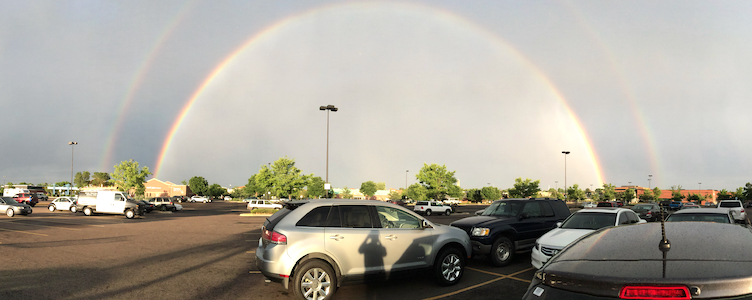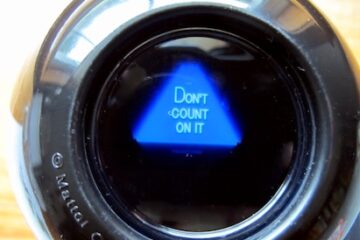The death of a future story you’ve been telling yourself
A friend asked yesterday about my anthems—songs I turn to when I need a boost or pick-me-up. The one that always comes to mind first is Steer by Missy Higgins.
There are many others that also lift me up, but this one in particular speaks to me. It has done, ever since the first time I heard it.
The stories we’re told by others
The song is about the freedom to live your own life, on your terms. It wasn’t until I watched the official video that I got the deeper meaning of someone stuck in a story that had been created by others.
In the video, the main character is forced to do the same self-destructive task over and over. One day, she realizes she’s had the ability to control her future the entire time, and she escapes to do her own thing.
A lot of people go through life feeling bound by the rules of a story told by others.
Whether it’s a story your parents made up for you (“you’re going to be a doctor”), a story preached to you (“there are only two genders”), or a story imposed upon you (“you must drive this car into a wall”), we’re constantly told that in many ways, we’re just a passenger in a life driven by external forces.
We must conform to values, standards, and rules that other people set for us.
The “future story” we tell ourselves
Each of us is the main character in our own lives. We also have many external pressures pushing on us from all sides. Family expectations, societal standards, work obligations, health concerns, even the weather.
Life is complicated. There are so many things outside of our control.
Within that complex context, each of us is constantly building a new “future story” based on where we’ve been, what we hope for, the pressures shaping our lives, and the values we hold.
In the music video above, the main character’s future story is always the same—get into a car, crash into the wall—until she realizes she has the power to change it.
Here are two examples of future stories that I’ve told myself in the past:
and
“Til death do us part”
The death of a future story
When looking up the link to the Missy Higgins video, I was surprised to stumble on this recent interview in which she talks about separating from her husband.
She says it was “the death of a story that I’d told myself for so long.”
The happily-ever-after culture of “til death do us part” creates phrases like “failed marriage” and the expectation that anything less than lifelong monogamous bliss is a tragedy. She even remarks on how she comes from a culture that values longevity of marriage, and how that shaped the story she was telling herself.
She wanted to be able to stick it out. She wanted to be “the one that managed to do it.”
I get it. I think everyone who speaks wedding vows in front of friends and family (and their god(ess)(es)) gets it. You want to be “the one that managed to do it,” even when so many others “fail.”
Things change. Circumstances change. People change.
When my ex-wife and I separated nearly four years ago, after 30 years of marriage, I mentioned our separation to one of my coworkers. This coworker replied, “Oh, that’s sad. Failed marriages are so hard.”
I was stunned. This was a licensed therapist I was talking to.
I said, “I don’t have a failed marriage. I had a very successful marriage that lasted 30 years, produced two amazing kids and a whole lot of wonderful memories, and now is over.”
Even the therapist, who had been in that work for decades, was acting under the influence of the overwhelming cultural norms that drive so many of our decisions every day.
It’s a story we tell ourselves, but it’s based on rules made up by others and perpetuated through popular culture, peer pressure, profit-based industries, and lack of imagination.
Letting go of the old future story
I’m not saying divorce was easy. Nor was it simple, or quick. We worked hard and tried a lot of things, both conventional and unconventional, to “make it work.”
After all, we had a lot of shared history over 30 years. There was a lot to hold on to. And it affected everyone who’d been on the ride with us.

the vow “til death do us part”
gets complicated
Around that same time, I was talking with a friend who said she would never, ever get divorced. It just was not what they did in her family. Her mother and father were still together in their 80s, even though they had “despised each other for decades.”
I think about that couple and how they twist and contort their lives, sacrificing so much by making “til death do us part” the most important part of their story.
That’s their choice, and I don’t have any right to judge it. My ex and I decided to make a different choice. Not everyone agreed it was the right choice, but it was not their choice to make. It was ours.
In the end, “making it work” was all about keeping alive the future story we’d created 30 years earlier and had been telling ourselves ever since.
It’s okay to mourn the death of a future story
There are some people who can’t forgive us for steering off the track they’d always imagined. They can’t accept that for us, a happier future meant redefining our relationship from marriage to friendship.
They can’t understand that we are the main characters in our own lives, and we have the ability—the obligation—to steer for ourselves.
They cling to their version of our future story. Their attitude is more “how can you do this to me” than “you must make your own choices.”
We’re constantly writing and re-writing our future stories. Letting go of the stories we’ve been telling ourselves for so long can be painful and hard.
During the process of letting go, it’s hard to see new potential futures. It can be frightening to let go of the old stories, the old dreams.
Especially if those dreams were built in our childhoods, then reinforced over years through different phases of life. Even harder if they’re bricks making up the foundation of other dreams.
But letting go is necessary in order to move forward, and sometimes letting go means being able to recognize, and even mourn, the loss of the future story—the expectations, the dreams, the hopes that disappear with such a big change.
“I guess it’s time for new dreams.”
I remember standing in a parking lot at a mall, talking with a friend shortly after deciding to divorce.
“You had so many dreams about your life as empty nesters,” my friend said.
“I guess it’s time for new dreams,” I remember replying.
But the search ends here
Missy Higgins, “Steer“
Where the night is totally clear
And your heart is fierce
So now you finally know
That you control where you go
You can steer




2 Comments
Your future self is a jerk. Don’t let them get away with it. - Gray Bear Coaching LLC · July 11, 2023 at 12:18 pm
[…] That’s what I mean when I say, “I guess it’s time for new dreams.“ […]
Knowing when it’s time to stop - Gray Bear Coaching LLC · July 7, 2025 at 12:18 pm
[…] that you’re clinging to the wrong outcome, like when two people who should split up make “til death do us part” the most important part of their story. Sometimes, you’re focusing on the wrong criteria […]